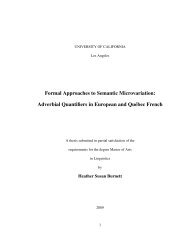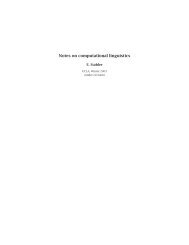miya-english-hausa dictionary - UCLA Department of Linguistics
miya-english-hausa dictionary - UCLA Department of Linguistics
miya-english-hausa dictionary - UCLA Department of Linguistics
You also want an ePaper? Increase the reach of your titles
YUMPU automatically turns print PDFs into web optimized ePapers that Google loves.
Miya-English-Hausa Dictionary 34<br />
myaw (L) n.m. death | mutuwa<br />
muw (T) n.f. (pl. muwaww) python, probably African rock python (Python<br />
sebae) | mesa, muuwa<br />
mku (H) n.f. (pl. mkwakww) sun, daytime ex tyak mku spending the day | rana<br />
mkwa (H) adv.time at midday ex s‰ mkwa they rested at midday | da rana<br />
mtsm (TH) n.f. tamarind (Tamarindus indica) | tsa<strong>miya</strong><br />
N<br />
n aux. 1. formative <strong>of</strong> uncertain function that sometimes appears in negative imperfective<br />
and negative non-verbal sentencs ex nj m nluw jf” nzw she doesn’t love her<br />
husband; m d m n tsn? aren’t you going to give me any?; tard ían tuws”<br />
m nkmw he will find that his wife is not at home; íiyk t” m n ímw<br />
thereupon he no longer has a wife. 2. perhaps the same formative is see in t-n<br />
conditional with non-perfective clauses--see tn |<br />
nn (TH) adv.time today | yau<br />
n”tsay (HL) v.A2 (v.n. ntsyak” (m)) submerge, dive under water ex n”tsya sw ˘<br />
byay he submerged under the water | nitse<br />
n (T) linker ( ny) (f. t) 1. genitive linker for masculine head noun. 2. head <strong>of</strong><br />
masculine independent genitive. 3. head <strong>of</strong> masculine ordinal numeral | -n, na<br />
n (L) interr. (see = w for other types <strong>of</strong> questions) question marker, apparently<br />
restricted to focused subject equational questions ex Ndwya/fy w jik n? who is<br />
Nduya/who are you? |<br />
na (L) v.D (v.n. nhy (f)) 1. (with ICP) become ripe ex natl”n sy they got ripe; zw<br />
b nws” ripe corn. 2. (no ICP) be done (cooking) ex n sy it is done (cooking) |<br />
nuna<br />
na (L) v.D (v.n. nhiy (f)) be tired ex mn nwan sy I’m tired | gaji<br />
na (T) aux. (directely follows relative pronoun, precedes subject pronoun and other<br />
auxliaries within clause) imperfective verbal auxiliary in relative clauses ex sm b na<br />
d buws the man who will come; ím m na d buwaz the woman who will come;<br />
zhk” m na m”n d íaratl takn whi kn the donkey on which I will put this load |<br />
ní” (H) n.f. bush duiker (Silvicapra grimmia) | gada<br />
naa (bor) v.B bor (v.n. nk”) turban (a chief) | naa (sarki)<br />
na” (HH) v.A1 (v.n. nak) sharpen (blade) ex na” srm he sharpened the knife |<br />
wasa<br />
nk”n (T) det.m. ( nyk”n) (f. tk”n) this, this one | wannan (namiji)<br />
nka (T) det.m. ( nyka) (f. tka) that, that one (distant) | wancan<br />
nnki (TH) n.m. (pl. nnkakw) saliva | yawu<br />
nay (HL) v.A1 (v.n. nyk”) see; look at | gani, duba<br />
ny = n ` (TL) presentative (invariable regardless <strong>of</strong> complement) here’s …, there’s …<br />
ex ny ywun yka k there’s an elephant (over there); ny ywunnw yka k there<br />
are some elephants (over there); ny knwan íykn k”n here’s my house | ga Ö<br />
nd (T) adv. just, only ex Q: F tlafw kkwa? - A: Nd lfiy. (standard morning<br />
greeting) Q: How did you arise? - A: Just fine.; Q: ín wtl”my? - A: Tln nd”<br />
kwaray. Q: How are the children? - A: They are just fine.; yr nma nd- wty we

















